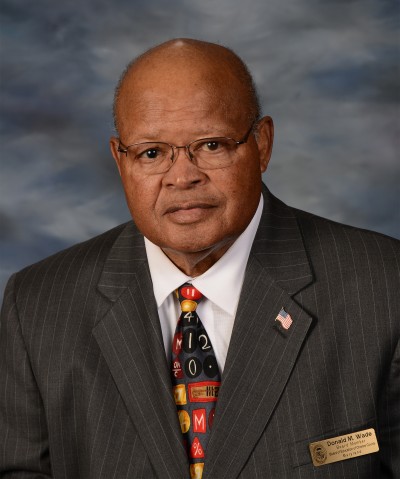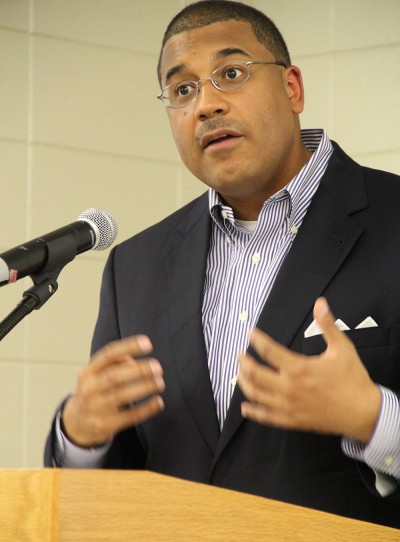The Board of Education today approved the appointment of two vice principals at the high-school level. Appointed were Philip Genua as a vice principal at North Point High School, and Douglas Lamb as a vice principal at Westlake High School.
Genua most recently served as an administrative assistant at Henry E. Lackey High School, where he also taught physical education for six years. He started his career with Charles County Public Schools in 2004 as a physical education teacher at J.C. Parks Elementary School.
Lamb started his career with the school system as a special education teacher at Thomas Stone High School in 1999. In 2006, he took a special education teaching position at Lackey. Lamb has also coordinated the Charles County Public Schools Summer School program for the past four years.
Both appointments take effect immediately.
Wade Honored by State Board for Commitment to Education

Donald M. Wade. (Photo: CCPS)
Donald M. Wade, a longtime Charles County Board of Education member and former chairman, was recently named the 2013 recipient of the Maryland Association of Boards of Education (MABE) Charles W. Willis Award. The award is named for the first executive director of the Association and is presented to a board member in Maryland who has made outstanding contributions to the school Board and school system they serve. Wade was nominated for the award by Charles County Board of Education Chairman Roberta S. Wise, and was selected from a number of highly-qualified candidates.
Wade was unaware that he had been nominated for the award and said he was shocked when he received the phone call from MABE that he was this year’s recipient.
“I was shocked when I was notified that I was the award winner this year. Honestly, it took me a few minutes to fully understand that I was nominated and selected. It is truly humbling to receive such a prestigious award. I am honored to represent the Charles County Board of Education and to work on behalf of children in the community. It all comes down to the children and making programs and opportunities accessible to them in order for them to achieve success,” Wade said.
Wade is currently serving his fourth, four-year term with the Board of Education and was first elected in 1998. He was nominated for the passion he shows for student achievement and his dedication to implementing programs that foster student successes and provide a well-rounded, quality education for all children. He was also nominated for his role in the implementation of the Junior Reserve Officers Training Corp (JROTC) and three-year-old programs in Charles County Public Schools.
In his award nomination, Wise said Wade is most deserving of an award that highlights service to the community. “He invests his personal time to promote the school system, to engage the public and to ensure the development of sound educational policy. He insists that each decision and policy the Board makes should focus on students, and he is adamant that the Board must operate as a team united for Charles County Public Schools and its students,” Wise wrote in the nomination.
During his tenure on the Board, Wade has served three, one-year terms as chairman, and two terms as vice chairman. He strives to provide children with a quality education and is actively engaged in eliminating the achievement gap through early childhood education and reading programs. He also serves as a resource for the school system in the advancement of Science, Technology, Engineering and Mathematics (STEM) programs. Additionally, Wade co-founded the Charles County Think Tank for Education, a community group devoted to the thoughtful advancement of education, and is the founder of the County Veteran’s Memorial Committee.
In addition to serving on the Board of Education in Charles County, Wade is an active member of MABE, and has served on their Board of Directors and several MABE committees. He also served as a member for the Archdiocesan Board of Education for the past three years and has received additional accolades for his community service.
Wade joined the United States Air Force in 1960 after receiving a regular commission to serve as a Second Lieutenant from the University of Maryland, College Park ROTC program. He spent 30 years on active duty and was an Assistant Professor of Aerospace Studies at three universities. He was a teacher, a department chairperson and a faculty advisor to 21 JROTC units in Prince George's County before retiring in 2006. He is a graduate of the University of Maryland, Eastern Shore, and earned a Master of Science degree in education (guidance and counseling).
Wade will be honored by MABE at their annual conference in October.
For more information on MABE and the Willis award, visit www.mabe.org.
School System, Space Foundation Host Educational Exchange

Frank Rose, deputy assistant secretary for space and defense policy bureau of arms control, verification and compliance for the United States Department of State, who served as the keynote speaker at the annual Charles County Public Schools, Space Foundation Educational Exchange held July 30 at North Point High School. (Photo: CCPS)
Frank Rose knows all about space trash, space policy and the importance of space in everyday life.
Rose, the deputy assistant secretary for space and defense policy bureau of arms control, verification and compliance for the United States Department of State, told the audience of a recent Educational Exchange to think about how vital space and space exploration is to the United States economy and national security. GPS systems, cell phones, credit card transactions and even pumping gas are reliant on satellites and space research, which has changed the way we operate, Rose said.
Rose was the keynote speaker July 30 at the annual Educational Exchange sponsored by Charles County Public Schools (CCPS) and the Space Foundation at North Point High School. Teachers participating in the Space Foundation Discovery Institute classes attended the luncheon as part of their weeklong program that is part of a seven-year partnership between CCPS and the Space Foundation and helps teachers infuse space concepts in their classrooms and lessons.
Rose, who advises the Assistant Secretary of State on key issues related to arms control and defense policy, including missile defense, military space policy and conventional arms control, said space operations have changed drastically in the past 50 years. Space exploration has moved from a field once dominated by the United States and Soviet Union to sharing space with 60 nations operating satellites in outer space as well as private sector satellites. “It is becoming congested,” Rose said, adding that part of the congestion is space debris, including more than 22,000 pieces of space waste larger than 10 cm that is tracked. He said that waste includes things like a toothbrush and a wrench, but also more than 500,000 smaller pieces that the U.S. cannot track. “It poses a threat to satellites,” Rose said, and tracking helps countries avoid collisions of satellite and debris.
National Space policy, Rose said, places priority on maintaining the integrity of the space environment and directs the United States to expand international partnerships, mitigate orbital debris and strengthen U.S. space leadership. He said countries are trying to develop a voluntary code of conduct for outer space and quoted former Secretary of State Hillary Clinton, who pushed for the development of ways to maintain long-term sustainability of space. Clinton previously said, “The long-term sustainability of our space environment is at serious risk from space debris and irresponsible actors. Unless we take action to reverse these trends, it could have damaging consequences for all of us.”
Superintendent of Schools Kimberly Hill opened the Educational Exchange by thanking teachers for their commitment to the program and the Space Foundation for its partnership that has helped CCPS create a model STEM program for children. Hill said she plans to continue the CCPS partnership with the Space Foundation. “We are a better school system today because of our partnership,” Hill said.
System, Board of Education Consider Testing Policy Changes
Some students will take fewer exams this year if the Board of Education approves testing policy changes.
Assistant Superintendent of Instruction Amy Hollstein asked the Board of Education on Tuesday to approve suggested policy changes that eliminate quarterly exams and introduce pre- and post-testing procedures to better align to the Common Core State Standards.
Quarterly exams no longer meet the needs of students or teachers with the transition to the common core standards and student achievement-centered teacher evaluations, Hollstein said. The proposed testing changes may reduce the number of tests students take, create tests that provide teachers and students more meaningful data, and are based on a beginning of the year pre-test followed by a period of instruction. Students will take post-tests to assess the impact of instruction and measure growth.
If approved, students would take pre-tests between Aug. 26 and Sept. 6 and post-tests between Feb. 10 and Feb. 28. Schools would share pre- and post-test results with parents in home reports distributed April 22.
Changes to testing include:
-- grades 1-8 reading pre/post tests;
-- grades 1-8 math pre/post tests;
-- elementary science pre/post tests;
-- middle school science pre/post tests;
-- English III pre/post tests; and
-- the addition of a more rigorous writing piece to grades 1-8 reading assessments.
Changing the testing procedure requires Board approval. Superintendent Kimberly Hill provided wording changes to Board policies 6411.7 and 6411.8, which can be found on the Charles County Public Schools website at http://www.ccboe.com under BoardDocs.
Several Board members expressed support for reducing the number of tests students are required to take during the year, which include both county and state assessments. The Board meets 6 p.m., Aug. 26, at the Jesse L. Starkey Administration Building to discuss the policy changes.


